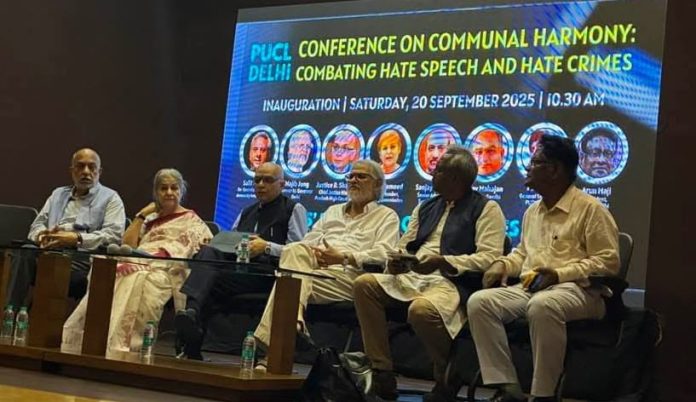New Delhi: The People’s Union for Civil Liberties (PUCL) Delhi organised a two-day national conference titled “Communal Harmony: Combating Hate Crimes and Hate Speech” at Jawahar Bhawan on September 20–21. Legal experts, civil society members, journalists, activists, academics, and political thinkers convened to address the alarming rise of communal violence and hate rhetoric targeting minority communities in India.
Speakers cited data showing a 74% increase in hate speech incidents in 2024, particularly affecting Muslims and Christians. A PUCL representative warned that India risks sliding into majoritarian autocracy, where hate speech is often legitimised through political rhetoric, state inaction, and media complicity.
While laws like Sections 196, 295A, 197, and 353 of the Bhartiya Nyay Sanhita 2023 provide a legal framework to prosecute hate speech, participants stressed enforcement remains inconsistent due to political interference and lack of institutional will.
Panel discussions highlighted notable cases, including digital harassment of Muslim women through platforms like “Sulli Deals” and “Bulli Bai,” violence against Christians in 2024, and economic boycotts of Muslim traders in states such as Uttar Pradesh and Uttarakhand. Speakers noted these are systemic patterns rather than isolated acts.
The conference examined the role of media and judiciary in enabling communalism. Participants condemned sensationalist reporting and misinformation on social media, as well as the influence of ideological biases within courts. Justice Jaspal Singh traced the history of communalism in India and warned that political exploitation and social divisions, not religion, fuel hate. He urged citizens to safeguard harmony through education, tolerance, and mutual respect.
A major outcome was the formation of an Action Committee to monitor, document, and counter hate crimes nationwide. The committee will advocate for legal reforms, judicial accountability, and a national campaign promoting secular values. Speakers called on political parties to actively condemn hate speech and take responsibility for communal tensions.
PUCL emphasised that combating hate crimes is not merely a law-and-order matter but a fundamental challenge to India’s constitutional promise of secularism, equality, and fraternity. The conference concluded with a call for urgent, united action to rebuild trust, ensure communal harmony, and protect India’s social fabric.
In his concluding remarks, Justice Jaspal Singh reflected on the pressing issue of communal harmony in India, tracing its fragile journey from independence in 1947 to the present day. He described India as a land of many religions, cultures, and traditions, where unity and coexistence remain the true pillars of progress. Yet, he warned, communal riots and hatred have repeatedly shattered this peace, leaving behind destruction, mistrust, and deep scars on society.
Justice Singh underlined that communalism is not tied to any single religion but stems from political exploitation, misinformation, and entrenched social divisions. Recalling incidents of violence in Delhi and other parts of the country, he noted with concern how neighbors who once lived in harmony were turned against one another. He questioned why religion—meant to guide humanity toward compassion and peace—was instead being twisted into a tool for violence and bloodshed.
He was sharply critical of the role of politicians who, for narrow personal gain, spread communal hatred and deepen divides. At the same time, he placed responsibility on ordinary citizens to safeguard harmony. Education, tolerance, and mutual respect, he said, are the most effective antidotes to communalism.
Concluding with an appeal to the younger generation, Justice Singh urged them to transcend the boundaries of religion and caste, to embrace brotherhood, and to build a nation where every individual can live with dignity, equality, and peace.




